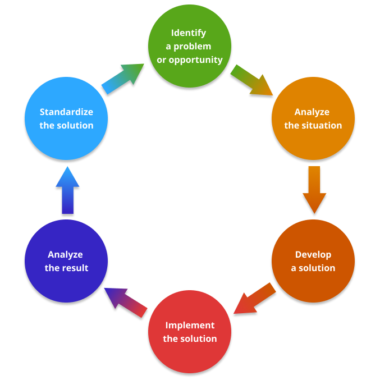In the world of making things better, there’s a cool Japanese idea called Kaizen. It’s all about making small but steady improvements in whatever you do. Think of it like tidying up your room a little bit every day instead of waiting for a huge mess to build up.
What Kaizen Is All About
Kaizen is about finding little ways to make life easier or better. It’s not about making big changes all at once, but rather about making small tweaks over time. This idea comes from Japan, where they believe that even the tiniest improvements can add up to something big.

How It Works
With Kaizen, everyone pitches in. It’s not just the boss’s job to come up with ideas – everyone gets to share their thoughts. Whether it’s a better way to do your chores or a new idea for your school project, Kaizen says that everyone’s ideas count.
How You Can Benefit
When you use Kaizen, you’ll start to see some cool changes. Maybe you’ll get better at doing your homework because you found a smarter way to organize your stuff. Or perhaps you’ll find that cleaning your room isn’t such a big chore anymore because you’ve figured out a faster way to get it done. Plus, when everyone works together, things just seem to run smoother.
Putting Kaizen into Action
Using Kaizen is all about trying new things and seeing what works. Maybe you’ll come up with a plan for getting ready in the morning that saves you time, or perhaps you’ll find a better way to study for your tests. The key is to keep trying new ideas and seeing what sticks.
Why Kaizen Rocks
Kaizen isn’t just about making things better – it’s about making life more awesome. When you’re always looking for ways to improve, you’ll find that even the smallest changes can make a big difference. So next time you’re stuck on a problem or feeling frustrated, remember that with Kaizen, there’s always a way to make things better.
How Kaizen Works
So, how does Kaizen make all this happen? Well, it’s pretty simple. Instead of waiting for a big problem to come along, Kaizen says you should always be on the lookout for little things you can do to make life smoother. It’s like fixing a leaky faucet before it turns into a flood – small fixes now can prevent big problems later.
When you use Kaizen, you’ll start to notice all sorts of opportunities for improvement. Maybe you’ll find a quicker way to do your chores or a smarter way to organize your schoolwork. The key is to keep your eyes open and your mind ready for new ideas. Before you know it, you’ll be a Kaizen pro, making life better one small step at a time.
Available on macOS and iOS
Kaizen History
Imagine a world post-World War II, where a spark of innovation ignited in the heart of Japan’s manufacturing industry. It was here, amidst the remnants of conflict and the pursuit of progress, that the seeds of Kaizen were sown.
In the aftermath of the war, Toyota, one of Japan’s leading automobile manufacturers, embarked on a mission to revitalize its production processes. Drawing inspiration from American business and quality management teachings, Toyota introduced the concept of quality circles. These circles comprised groups of workers sharing similar tasks, convening regularly to dissect work-related challenges and engineer ingenious solutions.
The introduction of quality circles marked a turning point in Japan’s industrial landscape. By the 1950s, this revolutionary approach had taken root, captivating the imagination of industries far and wide. However, it wasn’t until the term “Kaizen” emerged that the world truly took notice.
Enter Masaaki Imai, a visionary organizational theorist and management consultant, whose name became synonymous with Kaizen. Born in 1930, Imai’s groundbreaking work on quality management, particularly Kaizen, reshaped the global business landscape.
In 1985, Imai founded the Kaizen Institute Consulting Group (KICG), a beacon of enlightenment for Western companies seeking to embrace Kaizen’s transformative power. With Imai at the helm, KICG embarked on a mission to democratize Kaizen, spreading its principles, systems, and tools to every corner of the globe.
Imai’s influence transcended mere consultancy; it permeated the literary realm, where his seminal works became gospel for aspiring business leaders. Among his notable contributions were “Kaizen: Japanese Spirit of Improvement” (1985), a manifesto that propelled Kaizen into the Western consciousness, and “Gemba Kaizen: A Commonsense, Low-Cost Approach to Management” (1997), a magnum opus that unveiled the essence of Kaizen in its purest form.
Today, the legacy of Kaizen endures as a testament to human ingenuity and the relentless pursuit of excellence. From the factory floors of Japan to the boardrooms of multinational corporations, the spirit of continuous improvement thrives, guided by the timeless wisdom of Masaaki Imai and the enduring principles of Kaizen.
Available on macOS and iOS


